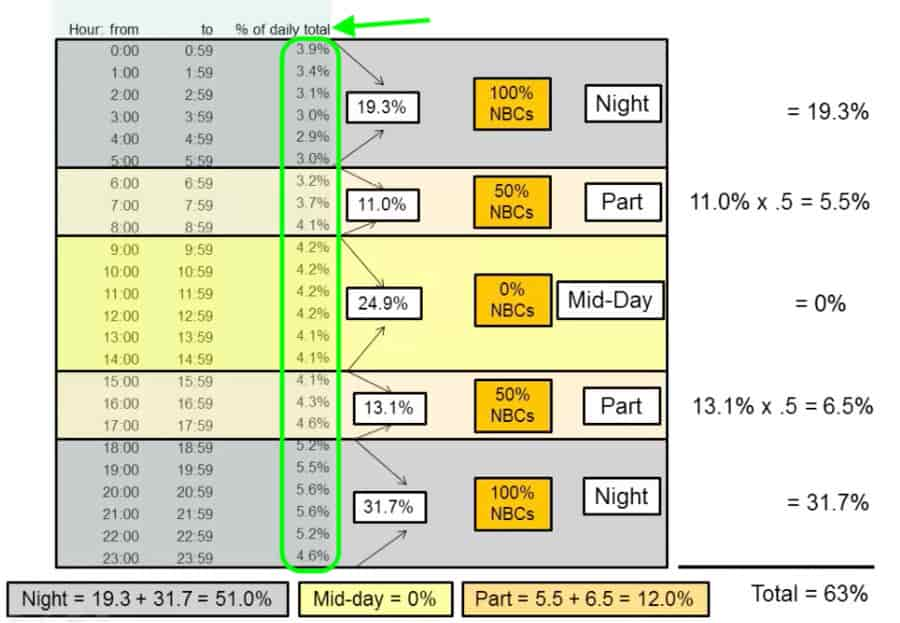1 Hour Solar Production - 1 Hour Energy Consumption
=
Amount of kWh that will get an NBC attached to them. Like a leech.
See You on the bright side!
Don't be one of those who are surprised by NBCs at the end of the year.
Let's talk about what are them, why do you have to pay them and how can you avoid them!
This is the trickiest one of all the Net Metering 2.0 policies, so pay close attention. Before Net Metering 2.0, these costs were canceled out by the excess energy you produced.
But according to the utilities, they were not able to recuperate these costs by how their economics work. And once again, people without solar were paying up for it.
The NBC's were instated so that homeowners with solar would also pay their share for low-income and energy efficiency programs that utilities have in collaboration with the state.
An NBC is a charge from ¢2 to ¢3 cents that gets added to every kWh you import from the grid. Or at least that's what almost everybody says because they don't truly know how these guys work...
These are accrued during the whole year and have to be paid at the time of your True Up Bill, which is a statement you'll get every 12 months from the date you went solar.
And by the way, they're non-bypassable. I wonder if that's where they got the name from? 🤔
But anyway, let's take a look at this graph. That's called a load profile. In other words, it's an average of how much energy you use in a day and during what hours:
First of all, let's take a look at this graph. That's called a load profile. In other words, it's an average of how much energy you use in a day and during what hours:

The thing with NBC's is that they get calculated per hour and per kWh,
not only per kWh. And that's why most people get it wrong or only go as far as explaining the concept but not how they work...
Every whole hour of the day, it's a race between your production and your consumption to see who wins. If at the end of any given hour, your solar production is more than your consumption, solar wins and you will NOT get any NBC's.
But if your consumption happens to be more than your production at the end of that hour, you will get an NBC added ONLY to those kWh that your solar was not able to produce.
Quick Reminder: it's every whole hour (8 am, 9am, 10 am, etc.)
So if at the end of that hour, your consumption wins the race... Then and only then, pull up your calculator and plug in this highly complex mathematical operation:

1 Hour Solar Production - 1 Hour Energy Consumption
=
Amount of kWh that will get an NBC attached to them. Like a leech.
In other words, you would get an NBC added to every kWh consumed beyond your total production in that 1-hour window.
Here's the graph from above, but on steroids, to help you implant all this madness into your brain:

Are you starting to get it? The reason why 100% of the kWhs you use at night get NBCs, is because your solar is not producing anything! Everything is coming straight from the grid.
The blocks that say "Part" are because the production is barely ramping up and around 50% of the consumption will still score NBC's, at least till 7.30 am where you're breakeven because your solar's output will cover all the energy you'd use.
Well, actually, 8 am because NBCs are calculated every
whole hour (8 am, 9 am, 10 am, etc.). Remember?
Now let's take a look at a prediction that will give you a pretty good idea of how many NBC's would leech to you on a normal day.
The values
circled in green are: What percentage of energy was consumed during that hour out of the 100% you'd typically use throughout the day.

After running the numbers, we can estimate that roughly 63% of your energy consumption in a day will be at the mercy of NBC's.
And how would that look like in dollar numbers?
Imagine that your average energy bill was $427 before solar, just like the guy from the case study we did in Section #1...
Not that bad huh? I bet you were thinking they would be a lot more!
✅ I know it's still a little something, but hey, with all the money you're going to be saving they're going to pay for themselves.
Check out these 👉Californian Case Studies👈 from people to went solar to see how much they're saving and how those savings pay for these kind of things.
The thing with NBCs, is that even if they say they're non-bypassable, you can still significantly reduce the amount that will leech onto you. How?
Let's start with this. If you want to charge your electric vehicle or you're planning on turning on the pool pump, or any other
high-usage appliance, try to do it on hours where your solar is in its prime.
Prime meaning highest production. Like from 10 am to 4 pm. That way you'll avoid NBC's since all the electricity being called for is going to be coming straight from your solar.
⚠️ All the calculations in this article and the ones for real-life projects are done to fit your current lifestyle. You are never forced to change your habits and preferred times just because you went solar.
NBC's only come around when at the end of every whole hour, your production is not enough to cover all the energy you used inside of that same hour. Like at night or when the sun is going down.
If you had a battery, you would technically be taking back your excess energy from it instead of from the grid, and that would drastically reduce NBC's by 40%.
🧠
No-Fluff Blog Posts
Let us know what you think...
